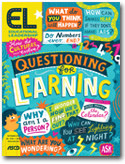September 1, 2015
•
5 min (est.)•
Vol. 73•
No. 1Show & Tell: A Video Column / Fostering Critical Thinking About Texts

Why do you think that? Can you show us where you found the information that helps you draw that conclusion? While Agustin is looking, can everyone else go back into the text to see where that information shows up?"
The questions middle school social studies teacher Lynell Davidson posed to Agustin and the rest of his class encapsulate an important shift in the way teachers are using questioning. Lynell and other educators understand that to comprehend and think critically about texts, students need two essential skills: an awareness of the cues that signal a need for critical thinking and the capability to use the cognitive and metacognitive tools that make such thinking possible (Costa & Kallick, 2014). Used well, text-dependent questioning can build both of these skills.
The Common Core State Standards highlight critical thinking as one of the dispositions needed for college, career, and life in a global society. But Socrates knew about the importance of critical thinking more than two millennia ago—and better yet, he knew how to unearth critical thinking through questioning. In a Socratic approach, a skilled and knowledgeable teacher poses questions that enable learners to first examine a problem or issue in its parts and then synthesize those parts to reach new conclusions.
We can see evidence of children's and adolescents' capacity for critical thinking in their daily lives. They select a toy after weighing the merits of several. They mount an argument for why the family needs a dog. They find a novel way to advance to a higher level in a video game. But without guidance, they're unlikely to use similar critical analysis to comprehend complex texts.
To read and analyze complex informational and literary texts, students need a path to follow. Over time, they will travel this path with increasing independence. Here's a text-dependent questioning protocol that provides such a path (Fisher, Frey, Anderson, & Thayre, 2014), with examples of questions an elementary teacher might ask during a discussion of an informational book about climbing Mount Everest:
1. What does the text say? We ask factual questions—who, what, when, where, how much, how many—to promote initial, literal analysis of the text and to build a foundation for the critical thinking to come. Don't rush past this stage; some students will need a bit more time figuring out the key details and main ideas. (How high is Mount Everest? Who are the Sherpas? What are the effects of low oxygen on humans?)
2. How does the text work? Next, we go a bit deeper to determine the text's structure. This includes the vocabulary and the expository or literary devices the author used to craft his or her message. (How does the writer help you understand what the terms acclimate and summit mean? How does the heading "Home Away from Home" link to the information about base camps, even though the writer never repeats the phrase? How would you describe the writer's opinion about the mountain, and what words and phrases does he use that support your answer?)
3. What does the text mean? Now that students have a strong foundation of knowledge about the literal and structural aspects of the text, they can move into critical analysis of its inferential meanings. Questions we pose at this stage might ask students to compare the text to another text they have read or to evaluate and make informed judgments about the information. (Are Sherpas key to a successful climb? What kind of preparation would a climber need to ascend the mountain?)
4. What does the text inspire you to do? Critical thinking ultimately results in new questions the reader has about the information. At this stage, students pose their own questions for investigation. They may write, debate, research, or present new information to others. (We can invite students to further exploration through questions like these: In this excerpt, the author doesn't explain why the journey down the mountain can be the most dangerous part of the trip. How can you investigate this statement further? How do the other highest mountains on Earth compare to Everest in terms of climate and how people live?)
In the that accompanies this column, you'll see portions of a text-based discussion led by high school English teacher Marisol Thayre as her students analyze a selection from Man's Search for Meaning, Victor Frankl's autobiographical account of his struggle to find meaning in suffering in a Nazi concentration camp. Marisol uses text-dependent questions to guide students' thinking, including
1. What does the text say? Marisol asks the class, What is the author telling us about? and What in the text lets us know that it's about the Holocaust? (In the video, we see one student pointing out that the author uses the word kapo, or concentration camp guard.)
2. How does the text work? Marisol asks, What is its tone? What feelings does Frankl convey? (Students mention feelings like panic and hope.) What words does he use to convey these feelings? She suggests that students underline specific words.
3. What does the text mean? Students discuss the question, What is the ultimate failure inside a concentration camp? What is Frankl asking of himself? (Most students suggested that the ultimate failure was giving up and that it was even worse than dying. Others maintained that Frankl was asking himself to survive so that he could understand human nature.)
4. What does the text inspire you to do? As a result of reading this text, some students engaged in a debate on the topic "avenge or forgive" as they read The Sunflower, another book by a concentration camp survivor (Wiesenthal, 1970). Others wrote in response to a prompt that required them to draw evidence from the various texts they had read to consider the ways in which Frankl rises above his situation. Still others engaged in research about the author's life and how the events inside the concentration camp shaped his future.
This protocol gives students time to think, to question, to debate, and to arrive at new conclusions—in short, to develop the dispositions needed to actively engage with their world.
Teaching Strategies
10 years ago
References
•
Costa, A. & Kallick. B. (2014). Dispositions: Reframing teaching and learning. Thousand Oaks, CA: Corwin.
•
Fisher, D., Frey, N., Anderson, H., & Thayre, M. (2014). Text-dependent questions: Pathways to close and critical reading, grades 6–12. Thousand Oaks, CA: Corwin.
•
Wiesenthal, S. (1970). The sunflower. New York: Opera Mundi.
